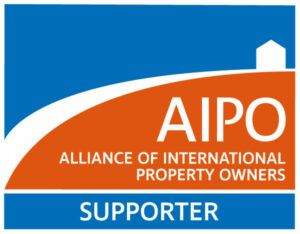About Us
Meet the Team

Dan Goodman

Thomas Eriksson

Paco Villa

Agnes Krzyżowska

Antonio OGE Media

Jakub Krzyżowski
Our real estate agency was established in 2010 with a specialization in residential properties in the regions of Alicante, Castilla-La Mancha, Murcia, and Valencia in Spain. Our focus on these specific regions has allowed us to gain extensive local knowledge and establish valuable connections. We take pride in providing comprehensive guidance and support throughout the process, including the facilitation of utilities, Padron, and bank account setup by offering personalized packages..
A sign of confidence in international property
The Association of International Property Professionals (AIPP) exists for one reason and one reason alone: to improve standards of professionalism in the international property market.
When you see that a company is a Member of the AIPP it means that have voluntarily agreed to follow and be bound by the industry Code of Conduct.
By using AIPP Members, you get: REASSURANCE, that a Member must act professionally and RECOURSE to the AIPP if problems occur
The badge of membership is a reminder to you, the buyer, that a company must follow professional standards, and act with honesty, integrity and transparency.
As a Member of the AIPP, we have voluntarily committed ourselves to industry regulation. To verify our membership, to read the Code of Conduct, or to find out more about the AIPP, visit www.aipp.org.uk.
We will promote the highest standards of professionalism in the international property industry, the Association of International Property Professionals (AIPP) has been set up to provide the consumer with confidence, and the industry professionals with a united voice.
AIPP do not sell property. They are a not-for-profit organisation whose aim is to improve the standards of professionalism in the international property market, helping both the industry and the public.
Thousands of people are buying overseas property: for holidays, for living or for investment. The AIPP provides a set of standards for those companies selling international property and is working to ensure that the public understands what it means when they see the AIPP Member logo on company literature.
AIPP Members have signed up to follow the AIPP Code of Conduct, a code established to help consumers by showing where they will find professional, accountable companies; it is an illustration of each Member’s commitment to high standards in their work.
Members must act with honesty, transparency, and integrity in all the dealings with the public and with the industry. For full details of the Code of Conduct and the AIPP Disciplinary Procedure, to which all Members have also agreed to be bound should the code not be followed, click on the highlighted links.
There is a full list of Members on this website; you can search by company name, membership number or simply view the full list.
At Olive Grove we are multilingual and advertise our Spanish properties in 60+ countries worldwide, focusing on Europe, USA & UK
Frequently Asked Questions
Yes it is easy to buy a house in Spain, but be sensible.
However, it is important to note that the process can differ from what buyers may be accustomed to in their home country, so it’s essential to understand the Spanish property buying process.
Firstly, it is crucial to research the Spanish property market to find the right property that meets your needs and budget. Once you have found a property that you like, you will need to make an offer, usually through an estate agent. If the offer is accepted, you will be required to pay a deposit to secure the property.
Next, you will need to hire a Spanish lawyer or gestor who will guide you through the legal aspects of the purchase, such as ensuring that the property has all the necessary permits and that there are no outstanding debts or liens on the property. The lawyer will also draw up the contracts and make sure that the purchase agreement is legally binding.
Once the contracts are signed, the completion date will be set, and the buyer will be required to transfer the full payment to the seller. The final step is to sign the deeds of the property before a notary public, and then the buyer will become the legal owner of the property.
It is worth noting that there are additional costs associated with buying a property in Spain, including taxes, notary fees, and registration fees, which can add up to around 10% of the purchase price. It’s also essential to factor in ongoing costs, such as property taxes and maintenance costs.
A rent with obligation to buy (alquiler con opción a compra)
During the rental period, the tenant pays rent, which is usually higher than the market rate to account for the option fee and the fact that a portion of the rent will be credited towards the purchase price. At the end of the rental period, the tenant has the option or obligation (depending on the agreed contract) to buy the property at the agreed price or walk away from the deal and forfeit the option fee, again depending on the conditions.
One advantage of rent to buy in Spain is that it allows tenants to test out a property and the surrounding area before committing to a purchase. It can also be a good option for people who have difficulty obtaining a mortgage or who are unsure about their future plans.
It’s important to note that rent to buy agreements in Spain can be complex and vary depending on the specific terms of the agreement. It’s recommended that anyone considering a rent to buy agreement seeks the advice of a qualified lawyer and/or real estate agent to ensure they fully understand the terms and conditions of the agreement.
It’s important to note that in Spain, a rent with obligation to buy agreement is a legally binding contract, and both the tenant and landlord have specific obligations that must be met. As with any major financial decision, it’s important to carefully consider the terms of the agreement and seek professional advice if necessary.
Alternatively, those who are not comfortable with a rent with obligation to buy agreement can explore other options for buying property in Spain, including obtaining a mortgage or paying in cash. It’s important to do thorough research and seek professional advice to ensure a smooth and successful property purchase process.
At Olive Grove Estates, we are happy to work with the Solicitor of your choice or recommend one we we have worked with in the past. We will assist your solicitor in every way we can.
Your Solicitor will do the majority of the work regarding the purchase of your property.
Generally the Estate Agent will have information from the Vendors and they will then liaise with the Solicitor who will then start conducting the various checks prior to completion taking place.
If at any stage of the purchasing process you have any questions then ask your Estate Agent or Solicitor who will be able to answer these questions for you.
Never feel that you don’t like to bother your Estate Agent with questions that you think they might think are silly, as if a question arises then obviously it needs an answer.
Once you have been to the notary, signed for your property and received the keys from the
vendors, the property becomes yours!! As soon as they property is yours you can move in
straight away. There will be a couple of formalities to complete such as change of utilities into your name and putting you on the local padron (electoral roll) and either your Solicitor or Estate Agent will help you with this. At Olive Grove Estates we are happy to assist you following completion of your purchase.
Olive Grove Estates
Calle Disseminados 1112,
02660.
Albacete
www.olivegroveestates.eu
info@olivegroveestates.eu
(0034) 687 167 255
(0034) 965 979 697
Placing foreign children into Spanish schools can be relatively easy and straightforward, although there are some important factors to consider.
Firstly, it is important to note that Spanish is the language of instruction in public schools in Spain, although some regions offer bilingual programs in English or other languages. As such, children who do not speak Spanish may struggle to keep up in class initially. However, many schools offer support for foreign students, such as language classes and tutoring.
To enroll a child in a Spanish school, parents will need to provide the child’s birth certificate, passport, and vaccination records, as well as proof of residency in Spain. It is also common for schools to require a transfer certificate from the child’s previous school, translated into Spanish.
In terms of alternative options for foreign children, there are several international schools located in Spain that offer programs in English or other languages. These schools often follow international curriculums, such as the International Baccalaureate, and may have a more diverse student body. However, tuition fees for international schools can be quite high, so this option may not be feasible for all families.
Another option is homeschooling, which is legal in Spain but requires parents to follow certain regulations and obtain approval from the Ministry of Education. Homeschooling may be a good choice for families who want more flexibility and control over their child’s education, or who live in areas where there are no suitable schools available.
Overall, while placing foreign children into Spanish schools may require some extra effort and adjustment, it is generally a feasible option. For families who prefer an alternative, international schools or homeschooling may also be viable choices.
In Inland Spain we are still very lucky with how the English are regarded by the Spanish. On
the whole the Spanish have a very welcoming nature and they are quite happy to share their homeland with the ex-pat community. In Inland Spain the numbers of ex-pats are very much reduced to those on the coast and therefore the traditional Spanish way of life still prevails.
They still have siestas and hold all their traditional Spanish Fiestas. The best way to integrate with the Spanish is to try speaking the language as this will afford you a lot more respect than if you expect them to speak English. Always remember you are moving to their country and if you respect their values and traditions you will find they will respect you in the same way.
It will always help if you have a few words of Spanish, no matter how few. Whilst it isn’t
essential for you to learn Spanish, the one thing you will notice is that in Inland Spain
compared to the coast, there is a lot less English spoken. If you move to an area where there are some ex-pats then you will more often than not find a friendly face who will help you out of an awkward situation and in many instances it is amazing how hand signals or drawings help out!! But don’t deny yourself the pleasure of trying out new Spanish words only to find that somebody does understand you. Of course you will make mistakes but the Spanish will warm to you much more if you make the effort of speaking to them in their native tongue.
You will find some Inland Spanish Towns and Villages offer free, or very cheap, Spanish
lessons to ex-pats to assist with the integration.
As a member of the European Union, Spain has specific regulations in place for bringing pets from other EU countries, including the UK. To bring a pet to Spain, you will need to follow certain guidelines and obtain the necessary documentation. Here is a brief explanation of the process:
Microchip: Your pet must have an ISO-compliant microchip that can be read by a scanner.
Vaccinations: Your pet must be vaccinated against rabies and have received the vaccination at least 21 days prior to travel.
EU Pet Passport: Your pet must have an EU Pet Passport, which is a document that lists your pet’s vaccinations and other important information. If you are traveling from a non-EU country, you will need to obtain a third-country veterinary certificate.
Tapeworm Treatment: If you are traveling from the UK, your pet must be treated for tapeworm between one and five days before entering Spain.
Airline Requirements: Airlines have their own regulations for bringing pets on board, so make sure to check with your airline before booking your flight.
Once you arrive in Spain, you may be required to have your pet inspected by a veterinarian at the airport. It is also a good idea to research local veterinarians in your area so that you can ensure your pet receives any necessary medical attention.
In summary, bringing a pet to Spain from the UK or another EU country is relatively straightforward as long as you follow the necessary guidelines and obtain the required documentation.
Remember an animal is the same whether English or Spanish and a vet will be there to help your pet, don’t panic if you feel cannot speak the language fully, the vet will still be able to help your pet.
You can import an English registered RHD drive car into Spain without any problem
whatsoever. Any Gestoria will be able to help you with this. It is a very quick and easy
process. The only thing you will have to do is change your headlights although the more
modern cars have an integral switch to do this. You also have to have an ITV (Spanish
equivalent to MOT) undertaken and then take all the paperwork to the Gestoria who will do
everything else for you. The cost for the Gestoria can vary from place to place but as a
guideline in Spring 2010 (Caudete) it was 118euros.
English appliances do work in Spain but if you are going to buy new appliances then it may be more beneficial to purchase them in Spain. The prime reason for this is that if there is a problem with the appliance when you have moved them to Spain it may not be covered under the guarantee. Whilst some appliances do have Worldwide cover it would be beneficial to check this prior to paying for the appliance to be transported across to Spain.
Separately, when making purchases here in Spain, shops are very keen to give discount
especially in the Inland Spanish areas where they like to know that people are buying their
products locally and supporting their local community.
The medical service in Spain is excellent and this is through personal experience and also that of Clients. When ringing for a doctors appointment you are likely to be given one for the same day, if not it will be the following day. If the doctors have any concerns whatsoever and feel you need further tests, you are referred the same day – in fact you take the paperwork to the receptionist who then faxes it through to the hospital.
The waiting lists are almost non-existent and the healthcare from the professionals excellent.
Hospitals like to have the most modern equipment and utilise this to its full potential. Unlike English hospitals though, the families do the day-to-day care and are actively encouraged to undertake all the lesser duties thereby allowing the nurses and doctors to do the jobs they are paid to do. Visiting hours are all day and families are actively encouraged to spend as much time as possible there. This is very subjective dependent upon where you choose to live.
Inland Spain is definitely cheaper than the coasts and can be cheaper for many things than
England. For further information on our current guide, please request our «Cost of Living»
Please note the information provided in this information pack is of general interest only and is not to be construed or intended as substitute for professional legal advice. Laws and tax rates change over time, so this information may be out of date. Please consult a tax specialist or the tax authorities for the latest information. There are no guarantees that this information is correct and up-to-date, so you use this information at your own risk. (03/01/2021)
What are the costs involved in buying a property in Spain?
As a buyer of property in Spain there are a number of costs and taxes over and above the property price that you will have to pay. Depending upon whether you are buying a new property from a developer, or a resale property from a private individual, you will either have to pay VAT & Stamp Duty, or a transfer tax. The different cases are explained below, along with the other costs and taxes that are common to both cases.
1. Costs associated with buying a new home from a developer (or bank)
These are the costs you will face when buying a new home in Spain from a developer or bank. It doesn’t matter how long ago the property was built. To count as a new home it must never have been sold before.
1.1 VAT & Stamp Duty (IVA & Actos Jurídicos Documentados – AJD)
These taxes apply for residential properties being sold for the first time (never previously occupied), or for commercial properties and plots of land. This is a national tax, so VAT is the same wherever the property is located (with the exception of the Canaries, which have their own version of VAT).
At present VAT (known as IVA in Spain) is 10% on the purchase price of residential properties (villa, apartment, etc), and 21% for commercial properties and plots of land.
VAT on new homes in the Canaries is known as IGIC (Impuesto General Indirecto Canario), and currently stands at 4.5%
VAT on newly-built homes rose from 4% to 10% on 01/01/2012.
The Stamp duty (known as AJD) is 1% of the price of the purchase, but might go up in some regions, so be sure to check on the latest rate. Both VAT and Stamp Duty are paid by the buyer, and if any deposit is paid before completion of the sale, such deposit will be subject to VAT at the moment of payment of this deposit. In this scenario there is no transfer tax to pay.
2. Costs associated with buying a resale home in Spain
These are the costs you will face when buying a Spanish property that has been sold before. Generally speaking, that means when buying a home from a private individual.
2.1 Spanish Transfer Tax (Impuesto sobre Transmisiones Patrimoniales – ITP)
This tax applies if the property is deemed to be a second or posterior transfer (i.e. not the first time a newly built home is bought), and is paid by the buyer. If any deposit is paid before completion of the sale it is not subject to ITP pro rata. However the full amount of ITP still has to be paid upon completion. In this scenario there is no VAT to pay, and stamp duty is already included in this tax.
The Transfer Tax rate is ceded to the autonomous regions, who can choose to apply the general rate, or their own rate.
The general (national) rule of ITP is 7%, but many of the autonomous regions have applied higher local rates. The rate you pay depends upon the autonomous region where you buy (for more information see Transfer tax on resale homes – Impuesto de Transmisiones Patrimoniales (ITP))
2.2 Income tax provision when buying from non-residents
If the seller is not resident in Spain, the buyer has to withhold 3% of the purchase price and pay it to the tax authorities (application form 211). If this is not done the property will be considered by the tax authorities as the asset backing the capital gains tax liability of the seller. This condition is very unlikely to apply when purchasing from a developer.
3. Costs associated with both new build and resale property purchases in Spain
These are the additional expenses you are likely to face when buying any property in Spain, regardless of whether the property is new or not.
3.1 Estate agency Fees
Estate agency fees or commissions are paid by the seller, unless otherwise agreed. If the buyer uses a search agency then search fees are paid by the buyer.
Agents charge between 5% and 15% of the sale price, depending upon the region and type of property. Unless the buyer has specifically agreed to pay the agent’s fee this cost will be built into the sale price.
3.2 Legal Fees
You are strongly advised to hire a lawyer to help you during the buying process. Your lawyer drafts and reviews contracts on your behalf and can explain all the legal and administrative issues you face. Your lawyer should also carry out any necessary due diligence (checking ownership claim of the seller, charges on the property, permits, etc.) and arrange all the required documents to complete the process (property registration, tax payments, etc.).
A lawyer – Abogado in Spanish – will charge you according to the service you require. This will vary according to the complexity of the purchase. Many charge around 1% of the purchase price in legal fees. Be warned that some lawyers charge 1.5% or more of the sale price, which is a rip off. Even 1% can be unreasonably high given the work that is involved in a straightforward purchase of an expensive property with no legal complications. Your best option is to try and find a good lawyer who is prepared to charge on an hourly basis (we can recommend good lawyers for you). Legal fees for a purchase without any complications and charged on an hourly basis should be in the region of 1.000 to 2.500 Euros.
3.3 Spanish mortgage costs
If you choose to buy with a mortgage then this will incur several additional costs. First there will be the property valuation that the mortgage provider will require before granting the mortgage. This is paid for the by the buyer and can cost around 500 Euros. Then there will be the costs of the mortgage itself. This varies according to the provider, and even according to the particular branch. However there is usually some kind of opening fee of around 1% of the value of the mortgage. Up until Monday 12th November 2018 you would also have had to pay Stamp Duty known locally as Actos Jurídicos Documentados (AJD) on new mortgages (a tax which varied by region, and can be as much as 3,000€ on a mortgage with a face value of 100,000€), but but a change in the law means that from now on AJD will be paid by lenders. Finally a mortgage will increase the Notary expenses.
3.4 Spanish notary costs
Notary expenses are nearly always paid by the buyer and are calculated in relation to the purchase price declared in the deeds of sale. To be on the safe side you should calculate Notary fees as being 1% of the purchase price declared in the deeds of sale. In many cases however Notary fees are more like 0.5% (or less) of the price declared in the deeds.
3.5 Spanish Land Registry Inscription Fees
Expenses related to inscribing the sale with the land registry are also nearly always paid by the buyer, and are calculated in relation to the purchase price declared in the deeds of sale. To be on the safe side you should calculate 1% of the purchase price declared in the deeds, though once again it depends upon the property and the area, and the fee could be considerably lower.
4. Other costs associated with buying property in Spain
Though not strictly transaction costs like fees and taxes, there are other costs to bear in mind when buying a home in Spain. After all, they all come out of the same pocket – namely yours.
4.1 Banking Costs
To buy property in Spain you will almost certainly need to open an account with a bank in Spain, and may need to transfer money from abroad. There maybe international transfer costs – check with both banks – and if you need to exchange currency to buy Euros make sure you use a currency broker to get a good rate of exchange and overpaying for Euros. We are affiliated with A Place in The Sun and can get you preferential rates with them on exchanging money for your new property (usually 4% saved).
Once you have got the funds in place, you will need to pay the vendor on the day you complete the purchase. The most common way to do this is to take a banker’s cheque along to the notary’s office to give to the vendor when you sign the deeds. Banks try to charge as much as they can for issuing banker’s drafts, and I’ve even known them to charge 0.5% of the cheque’s value. However, you can also get them for as little as €50 to €60. It all depends on the deal you have with your bank. Make sure you clarify this with your bank before you ask for the cheque.
4.2 Furniture Costs
Once you own a property you will need to furnish it. The cost of furnishing a property depends entirely upon what you want. However as a very general rule of thumb a 2 bedroom apartment will cost around 10,000 to 15,000 Euros to furnish nicely if you buy everything new. Of course there is no limit to how much you can spend, though you can also get away with less than 10,000 if you are on a tight budget (all from IKEA, for example). There are of course much cheaper ways and there are a lot of 2nd hand shops and markets available where you can pick up incredible old traditional Spanish furniture at a very reasonable price.
4.3 Plusvalía Municipal Tax
This is normally paid by the vendor, but it can become a problem for the buyer if the vendor fails to pay it. Buyers have to be particularly careful with this tax when the vendor does not live in Spain. See the section below on costs to bear in mind when selling property in Spain for more information.
Before buying a property in Spain you may also wish to have a building or structural survey done, and that will have a cost. (we can arrange building surveys in Spain with our architect).
In Summary, allow for between 12% and 15% of the purchase price in taxes and other costs, though it does depend what and where you are buying.
Costs of owning property in Spain
There will of course be costs associated with owning a property in Spain. Some of these will be maintenance costs, such as cleaning, repairing, reforming, utility bills, rubbish collection, and so on. These will be determined by the size and type of the property you buy. Obviously a large villa with a garden and pool will require much more effort and cost to maintain than a small apartment. For cleaning a figure of 10 Euros an hour is fairly typical throughout Spain.
Apart from the general maintenance costs referred to above, there are a number of costs in the form of taxes and fees that property owners in Spain face.
Property Ownership Tax (Impuesto Sobre Bienes Inmuebles – IBI)
A local tax on the ownership of property in Spain, irrespective of whether the owner is a resident or not. Calculated on the basis of the valor catastral (an administrative value that is usually lower than the market value, sometimes considerably so) set by the town hall the tax rate goes from 0.4% – 1.1% of the valor catastral depending on the Spanish region.
Annual Wealth Tax (Impuesto Sobre Patrimonio)
This tax has been changed several times in recent years. For the latest situation see Spanish Wealth Tax (Patrimonio)
Personal Income Tax (Impuesto sobre la Renta de No Residentes – IRNR)
Non-residents who own property in Spain have to pay an annual income tax that varies according to whether the property is rented out or not.
Not rented out
Non-resident property owners who do not rent out their property and who do not have any other source of income in Spain pay income tax based on the value of their property. The tax rate is fixed as 25% of 2% of the valor catastral of the property.
The tax on a property with a valor catastral of 700,000 Euros would be as follows:
Property value for tax purposes = 700,000 Euros
Taxable base (2%) = 14,000 Euros
Tax (25%) = 3,500 Euros
Rented out
If non-residents rent out their property and receive an income in exchange, they are obliged by law to declare this income and pay taxes on it. The taxable base and the tax rate will be determined by the laws as they apply to each person’s particular circumstances (taking into account the double taxation treaty – if any – between Spain and the country of origin of the non-resident). In many cases non-residents simply pay a flat rate of 25% of the gross income they earn from their property in Spain.
Residents in Spain will have to pay the income tax based on their income earned during the year. The tax rate depends on the level of income.
Community Fees
Owners of property that is part of any development, building, or complex in which common zones are shared with other owners are by law obliged to be members of the community of owners, known as the Comunidad de Propietarios. This will entail paying community fees for the upkeep of the common areas, and any other services that the community vote for. The fees will vary according to the magnitude of the common areas, the costs of maintaining them, and the services that the community vote for. A budget for annual community expenses is approved by majority vote of all owners (or representatives) who are present at the annual general meeting of the Comunidad de Propietarios.
Insurance
Household insurance will vary according to the circumstances of the owner and the type of property. However it should be born in mind as a cost that all property owners will face.
NOTE: Costs to bear in mind when selling a property in Spain.
Plusvalia municipal tax
A special reference should be made to the local/municipal capital gains tax – known as Plusvalía. This is a local / municipal tax that only applies to the increase in value of the land upon which urban properties are built, and that is levied at the time of transfer of such properties. It is calculated on the basis of the valor catastral (an administrative value that is usually lower than the market value, sometimes considerably so) of the property. The amount to be paid will depend on how long the seller has owned the property: the longer the period of time during which the seller has owned the property, the higher the amount of tax.
This Plusvalía Municipal tax is usually paid by the vendor, but sometimes the buyer agrees to pay it – it’s part of the negotiation process. Be warned that if the vendor fails to pay it, the buyer then becomes liable for the unpaid tax, with interest!. Also, the town hall might not register the property for local real estate tax (IBI) purposes, until the Plusvalía is settled. That means the new owners starts accumulating unpaid IBI tax bills (without notification), plus penalties and interest, all without knowing it.
When the vendor is a non-resident, the law states the buyer is liable for this tax, even if the parties have agreed that the vendor will pay. So when you buy a property in Spain, especially from a non-resident vendor, make sure you or your lawyer checks that the Plusvalía Municipal has been paid by the vendor within 30 days of the sale.
The safest way to play this, from a buyer point of view, is to agree to pay this tax using funds deducted from the agreed sale price. That way the buyer can be sure the Plusvalía has been paid. This is particularly relevant when buying from a vendor who does not live in Spain (non-resident).
Capital gains tax
Spanish capital gains tax rates on property and other assets
If the vendor is a non-resident, there is also a Spanish withholding tax retention, which the buyer pays directly to the tax authorities, to cover the vendor’s capital gains liability
When buying property in Spain, always keep digital and hard copies of all invoices related to your purchase. Likewise, if you ever do building work on the property once you own it, keep copies of all licences and invoices. You may be able to offset these expenses against capital gains when you sell, and so reduce your Spanish capital gains tax on property sales
The right to buy property in Spain is not restricted to EU citizens. Anyone who can pay the purchase price is able to purchase property in Spain. Brexit has not changed that. Many people from all corners of the world buy and own property across Spain.
In Spain your right to do what you wish with a property that you own is not affected by your nationality. If you wish to buy a property in Spain to rent out, whether short term or long term, then you are still able to use the property for that purpose after Brexit, according to the rules applicable in each autonomous community.
What has changed is the rate at which you pay tax upon the rental income that you earn in Spain. EU residents pay tax on rental income in Spain at the rate of 19%. Brexit means that UK residents are obliged to pay tax at the same rate as non EU citizens, which is currently 24%. Whereas prior to Brexit you could reduce the amount chargeable to tax by deducting allowable expenses of the rental, that is no longer possible for UK residents who will be bound to pay 24% of the gross rental income in tax.
It is important to note, however, that you will be able to set off the tax paid in Spain against your UK tax bill for the same income.
However you are taxed on income received from your Spanish property, it will remain essential that you rent out your property in accordance with the local laws.
As Benjamin Franklin famously said, “In this world nothing can be said to be certain, except death and taxes.” Even Brexit cannot remove the certainty that if you own property in Spain you are obliged to pay tax. As you will have seen above, an effect of Brexit is that the rate of taxation has increased.
However, many of the taxes you are obliged to pay in relation to property ownership in Spain remain unchanged.
The main taxes you will encounter as a property owner in Spain are purchase tax, IBI (similar to council tax) and VAT (called IVA in Spain), all of which are charged at the same level no matter what your nationality.
Brexit does not affect inheritance tax payable in relation to the estate of a UK resident. Whereas inheritance tax payable varies according to the autonomous community (there are 17 in Spain) in which property is located, UK residents pay inheritance tax at the same rate as Spanish residents or other EU residents.
Before Brexit, as EU citizens, UK nationals benefited from freedom of movement, meaning that they had the freedom to live and work in any country within the European Union, including Spain.
Many Brits took advantage of that freedom of movement in order to start a new life in Spain, or to retire to Spain. The thought that this has become difficult after Brexit is very concerning for many who are considering buying property in Spain.
It has never been necessary for UK citizens travelling to Spain for a holiday to require a visa or any other travel document than their passport. That situation has not changed. According to the current rules, UK nationals can travel to Spain at any time as tourists, provided they do not stay longer than 90 days in any 180 day period.
If UK nationals want to stay in Spain for longer than that period, then they will need to apply for permission to do so.
Given that the global COVID-19 pandemic has straddled the end of the Brexit transition period, it is difficult to gauge whether Brexit has had any real impact on Spanish property prices.
As the pandemic restrictions ease and people can once again visit Spain to view property, we will have a better idea of the effect of Brexit on Spanish property prices.
If you have made the decision that owning a home in Spain is for you, Brexit need not deter you. The truth is that almost none of the fundamental aspects of buying and owning property in Spain have changed as a result of Brexit.
If you are thinking about buying property in Spain and you are concerned about how Brexit affects you, please be in contact with us and we can put you in touch with a solicitor.
Brexit Information last updated: 21 January 2021 – Solicitors in Spain
These are a selection of the questions we have been asked. Please be aware that we are human and as such we all want and need to know different things so if you have a question, no matter what it is, just ask.




